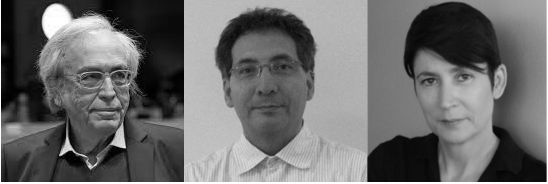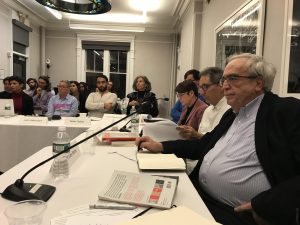Aristides Baltas, philosopher and former Minister of Culture of Greece, Eduardo Cadava, Department of English, Princeton University, Rosalind Morris, anthropologist, Columbia University. and Bernard E. Harcourt, CCCCT, Columbia University,
read and discuss
The Idea of Communism, edited by Slavoj Žižek et al. (selections), Verso Books 2010-2016
The “Idea of Communism”: The place to start, naturally, is to underscore the distinctly Platonic resonance of the expression itself and of our object of study. To discuss the “Idea of Communism”—with a capital “I”—is to explore communism’s ideal form, its essence, unsullied by the faulty and illusory human experiences we have had with it. It is to leave behind the shadows, to emerge from our cavernous history, to resume the search for the truth and true ambition of communism. This is the platonic orientation of Badiou and his “communist hypothesis”—namely, the effort to explore, beyond Marxist theory of the nineteenth century and Leninist and Maoist practices of the twentieth century, the guiding ideal or norm or “regulative Ideal.” It is what gave rise to the many interventions by political philosophers and critical thinkers, such as Slavoj Zizek, Étienne Balibar, Bruno Bosteels, Peter Hallward, Rosalind Morris, Claudia Pozzana, Alessandro Russo, and others collected in the multiple volumes, The Idea of Communism (Verso). It is what motivates Aristides Baltas’s reflections in his introduction to the edited volume, The Names of Communism?
But how does “the Idea of Communism,” with its distinctly platonic edge, fit in a series on “praxis,” such as Praxis 13/13? The platonic method, perhaps more than most philosophical approaches, tends toward the pole of theoria: It is contemplation and knowing thyself—gnothi seauton—that achieve the highest form of praxis. So is the method wedded to a platonic outcome, one that might tell us more about ideal republics than how to get there, or can it be plied to a more engaged and robust praxis?
What work does it do, in effect, to focus on the “Idea of Communism” for an inquiry into praxis?
This is the question we explore in Praxis 8/13 and we welcome you to the discussion!
[Read the full introduction here. © Bernard E. Harcourt.]


